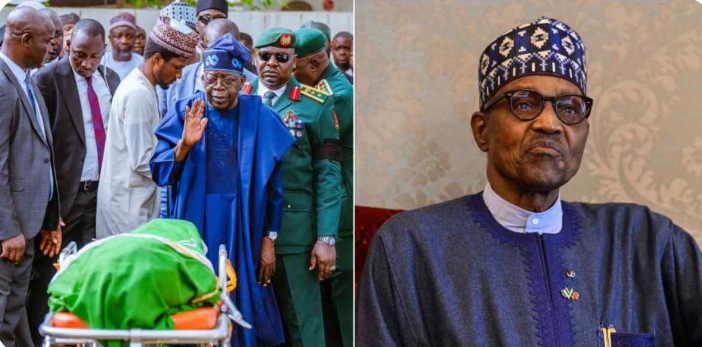
Grief as a Distraction: ADC Slams Tinubu for Alleged Political Exploitation of Buhari’s Death

In a fiery statement that has sparked fresh political tension, the African Democratic Congress (ADC) has launched a stinging rebuke against President Bola Ahmed Tinubu, accusing him of turning the recent death of former President Muhammadu Buhari into a calculated distraction from the failures of his administration. The party did not hold back in its scathing remarks, alleging that what should have been a solemn tribute to a departed leader was instead used as a political chess piece designed to manipulate public sentiment and rebrand a struggling government.
The controversy stems from a special session held by the Federal Executive Council (FEC) on Thursday at the State House in Abuja, where President Tinubu led a tribute to the late Buhari, describing him as “a good, decent, and honourable man,” and lauding his legacy of integrity, discipline, and patriotism. What many perceived as a heartfelt eulogy was, according to the ADC, nothing more than a “choreographed spectacle” tailored for optics and political gain.
Bolaji Abdullahi, the Interim National Publicity Secretary of the ADC, issued the party’s blistering response on Friday, calling out what he described as "rank hypocrisy" on the part of Tinubu’s government. Abdullahi pointed out that the administration had, for over a year, consistently blamed Buhari for Nigeria’s economic woes, harsh policy consequences, and public sector inefficiencies. To now align itself with the legacy of the same man it once vilified, the ADC argued, is a glaring contradiction and a brazen insult to Nigerians’ intelligence.
“The same government that disowned Buhari’s fuel subsidy stance, condemned his economic policies, and blamed him for a broken economy is now attempting to wrap itself in the flag of his memory,” the statement read. “This is nothing short of a cynical rebranding effort aimed at manipulating public emotions, especially among Buhari’s northern support base.”
Perhaps one of the most provocative aspects of the ADC’s criticism was its reaction to the presence of Buhari’s son, Yusuf, at the FEC session. The party questioned the motive behind involving a grieving family member in what it called a “stage-managed” event. “What kind of leadership exploits a mourning son just days after his father’s burial for political gain?” the ADC asked, pointing fingers at what it claimed was a shameless display of political theatre disguised as national mourning.
The party also highlighted what it claimed was a pattern of calculated moves by the Tinubu administration to rewrite recent history. The ADC noted that earlier in the administration’s tenure, numerous officials had openly criticized Buhari’s tenure, distancing themselves from his legacy to gain political credibility and justify the harsh economic decisions made in the present. “They labeled him fiscally reckless, claimed they inherited chaos—not from the opposition, but from within their own ranks—and now, when it suits them, they want to act as guardians of his memory?” the statement continued. “This is not only dishonest, it’s a dangerous attempt to distort the narrative and confuse the public.”
The ADC concluded by urging Nigerians not to be deceived by what it called “photo ops and stage-managed grief.” According to the party, this latest tribute was not about honoring a national leader but rather a tactical distraction from the persistent economic hardship, inflation, and public unrest that have defined the Tinubu administration’s time in office. “No public relations stunt can save a government that has behaved in the last two years like an army of occupation,” the party declared with finality.
As Nigeria moves steadily toward the 2027 general elections, the political climate has grown increasingly tense, and this recent development has only added fuel to an already volatile atmosphere. President Tinubu, who is widely believed to be eyeing a second term, has come under scrutiny for both his policy choices and public rhetoric. Critics argue that the administration’s refusal to take full responsibility for ongoing national crises—ranging from economic instability to widespread insecurity—has undermined public trust and created a leadership vacuum at the center.
While some political analysts acknowledge the importance of honoring former leaders, they also warn of the thin line between genuine tribute and political exploitation. The optics of mourning, especially in a politically charged environment like Nigeria’s, are often double-edged swords—capable of either uniting or further dividing a nation. In this case, the ADC’s reaction reflects a broader dissatisfaction with what many see as a government more concerned with perception than performance.
For many Nigerians, Buhari remains a polarizing figure. While some remember him as a disciplined and incorruptible leader, others criticize his handling of the economy, insecurity, and civil liberties. To now see the Tinubu administration both criticize and praise him in quick succession has raised eyebrows across the political spectrum. “You cannot erase over a year of blame-shifting with one day of choreographed grief,” one political commentator remarked. “It insults the intelligence of the Nigerian people.”
Whether this latest episode will have lasting political consequences remains to be seen, but one thing is clear: the ADC has successfully reignited the national debate around leadership, legacy, and accountability. By challenging what it calls a manipulative rebranding effort, the party has forced Nigerians to reconsider the sincerity behind government actions and the true motives behind state-sponsored tributes.
As the 2027 race looms larger on the horizon, it is evident that every word, every gesture, and every political maneuver will be dissected with increasing scrutiny. The lines between public service and political theater have never been more blurred, and in a nation yearning for authentic leadership, mere symbolism will not suffice. Whether President Tinubu’s tribute to Buhari was heartfelt or hollow, history—and the Nigerian people—will ultimately be the judge.


